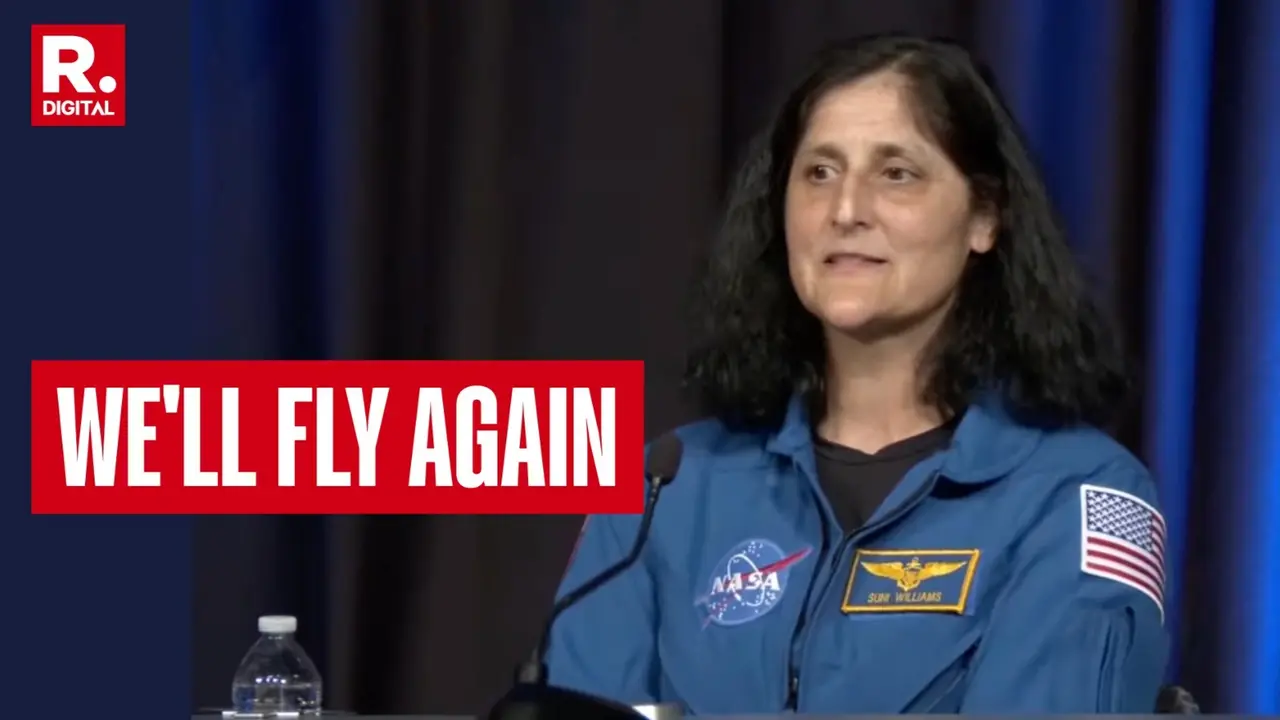Updated 1 April 2025 at 02:20 IST
Starliner Setback? No Problem! Sunita Williams And Butch Wilmore Say ‘We'll Fly Again’
Sunita Williams and Barry "Butch" Wilmore share insights into their extended mission aboard the ISS, expressing willingness to fly Starliner again.
- World News
- 4 min read

NASA astronauts Sunita Williams and Barry "Butch" Wilmore have finally spoken out about their extended mission aboard the International Space Station (ISS). Initially scheduled for a brief eight-day mission, the duo spent months in orbit due to technical issues with Boeing's Starliner spacecraft. Despite the challenges, Williams and Wilmore have expressed their willingness to fly Starliner again, praising its capabilities and the dedication of the NASA and Boeing teams.
Williams and Wilmore launched into space last year on June 5, aboard Boeing's Starliner spacecraft, expecting an eight-day stay at the ISS. The mission aimed to test the Starliner's capabilities and prepare it for future crewed missions. However, technical glitches, including helium leaks and thruster malfunctions, forced NASA to extend their stay.
During their extended stay, Williams and Wilmore adapted to life on the ISS, conducting science experiments, performing spacewalks, and maintaining the station's systems. They worked alongside the existing ISS crew, contributing to various research projects and experiments. The duo also had the opportunity to engage with students and educators through ham radio events, promoting STEM education and inspiring the next generation of explorers.
As their stay extended, Williams and Wilmore transitioned from being Starliner crew members to ISS crew members. They took on new responsibilities, including conducting spacewalks, maintaining the station's systems, and supporting scientific research. Their dedication and expertise were invaluable to the ISS crew, and they played a crucial role in ensuring the station's continued operation.
Advertisement
Also Read | We Prepared For Any Number of Contingencies: Butch Willmore Reflects on 9-Month Space Stay
Challenges At ISS
The mission was not without its challenges. President Donald Trump claimed that Williams and Wilmore were "virtually abandoned" in space, but the astronauts pushed back on this claim. "We don't feel abandoned," Wilmore insisted. She stated, "We don't feel stuck. We don't feel stranded. We come prepared. We come committed." Williams added that they were "doing pretty darn good, actually," pointing at the support they received from NASA and Boeing teams.
Advertisement
During their stay on the ISS, Williams and Wilmore contributed to various scientific research projects and experiments. They worked on projects such as studying plant growth and development in microgravity, testing stem cell technology, and conducting spacewalks to collect samples from the station's exterior. Their work helped advance our understanding of space and its effects on living organisms.
Williams and Wilmore's experience on the ISS stressed the importance of teamwork in space exploration. They worked closely with the ISS crew, NASA, and Boeing teams to overcome challenges and achieve their mission objectives. Their dedication and expertise were essential to the success of the mission.
The astronauts spent several months aboard the ISS, conducting numerous scientific experiments and supporting various research projects. The crew completed an impressive 900 hours of research, conducting over 150 unique experiments during their stay on the station.
Recovery And Rehabilitation After Return
After their return to Earth on March 18, Williams and Wilmore shared insights into their recovery process, during the press conference. Wilmore asserted that the role of specialised professionals in helping astronauts regain strength after extended missions remains to be important. "We have a dedicated team of specialists who integrate us into structured workout programs," he said. Williams acknowledged the physical adjustments required after returning to Earth, thanking their support team for guiding them through a structured recovery protocol.
Despite challenges, Williams and Wilmore maintained a positive outlook throughout their mission, showcasing the resilience and teamwork required for advancing human space exploration.
As NASA continues to push the boundaries of space exploration, the experiences of Williams and Wilmore will inform future missions. Their dedication and expertise will help shape the next generation of space explorers and inspire new discoveries.
During the presser, Sunita Williams and Barry "Butch" Wilmore's dedication, resilience and their willingness to fly Starliner again showcased their confidence in the spacecraft and the NASA and Boeing teams. The experts believed that as they continue their recovery and rehabilitation, their experiences will undoubtedly inform future space exploration missions.
NASA Astronauts Share Heartwarming Moment After Returning Home
After spending almost nine months aboard the International Space Station (ISS), NASA astronaut Sunita Williams had finally returned to Earth on March 18, alongside fellow astronauts Nick Hague and Butch Wilmore. During the news conference, Williams shared a heartwarming moment from her first few hours back on Earth - hugging her husband and dogs, and enjoying a delicious grilled cheese sandwich. "I hugged my husband and dogs and enjoyed a good grilled cheese sandwich," she said with a smile. The moment was a touching reminder of the human side of space exploration.
The Crew 9 mission marked a historic milestone in space exploration, with the crew making major contributions to various scientific fields. As Williams, Hague, and Wilmore settle back into life on Earth, their experiences will undoubtedly inform future missions and inspire new generations of explorers.
Published By : Abhishek Tiwari
Published On: 1 April 2025 at 02:01 IST
